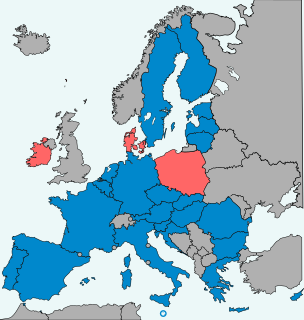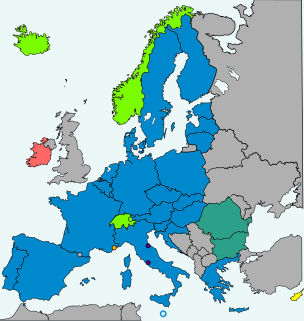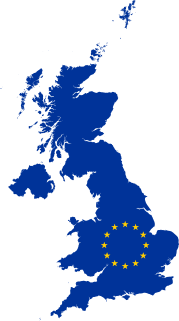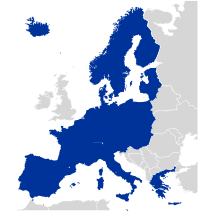
The Council of the European Union, often referred to in the treaties and other official documents simply as the Council, and informally known as the Council of Ministers, is the third of the seven Institutions of the European Union (EU) as listed in the Treaty on European Union. It is one of two legislative bodies and together with the European Parliament serves to amend and approve or veto the proposals of the European Commission, which holds the right of initiative.

The European Communities Act 1972, also known as the ECA 1972, was an Act of the Parliament of the United Kingdom which made legal provision for the accession of the United Kingdom to the three European Communities – the European Economic Community, European Atomic Energy Community (Euratom), and the European Coal and Steel Community ; the EEC and ECSC subsequently became the European Union. The Act also incorporated Community Law into the domestic law of the United Kingdom and its acquis communautaire, its treaties, regulations and directives, together with judgments of the European Court of Justice, and the Community Customs Union, the Common Agricultural Policy (CAP) and the Common Fisheries Policy (FCP).

A recommendation in the European Union, according to Article 288 of the Treaty on the Functioning of the European Union, is one of two kinds of non-legal binding acts cited in the Treaty of Rome.

The Schengen Agreement is a treaty which led to the creation of Europe's Schengen Area, in which internal border checks have largely been abolished. It was signed on 14 June 1985, near the town of Schengen, Luxembourg, by five of the ten member states of the then European Economic Community. It proposed measures intended to gradually abolish border checks at the signatories' common borders, including reduced-speed vehicle checks which allowed vehicles to cross borders without stopping, allowing residents in border areas freedom to cross borders away from fixed checkpoints, and the harmonisation of visa policies.

The Charter of Fundamental Rights of the European Union (CFR) enshrines certain political, social, and economic rights for European Union (EU) citizens and residents into EU law. It was drafted by the European Convention and solemnly proclaimed on 7 December 2000 by the European Parliament, the Council of Ministers and the European Commission. However, its then legal status was uncertain and it did not have full legal effect until the entry into force of the Treaty of Lisbon on 1 December 2009.

The following outline is provided as an overview of and topical guide to the European Union:
In European Union law, direct effect is the principle that Union law may, if appropriately framed, confer rights on individuals which the courts of member states of the European Union are bound to recognise and enforce.

The Treaty of Amsterdam, officially the Treaty of Amsterdam amending the Treaty on European Union, the Treaties establishing the European Communities and certain related acts, was signed on 2 October 1997, and entered into force on 1 May 1999; it made substantial changes to the Treaty of Maastricht, which had been signed in 1992.

The Single European Act (SEA) was the first major revision of the 1957 Treaty of Rome. The Act set the European Community an objective of establishing a single market by 31 December 1992, and a forerunner of the European Union's Common Foreign and Security Policy (CFSP) it helped codify European Political Co-operation. The amending treaty was signed at Luxembourg City on 17 February 1986 and at The Hague on 28 February 1986. It came into effect on 1 July 1987, under the Delors Commission.

The consent procedure is one of the special legislative procedures of the European Union. Introduced by the Single European Act, under this procedure, the Council of the European Union must obtain the European Parliament's consent (assent) before certain decisions can be made. Acceptance (consent) requires an absolute majority of votes in Parliament.

In European Union law, a decision is a legal instrument which is binding upon those individuals to which it is addressed. They are one of three kinds of legal instruments which may be effected under EU law which can have legally binding effects on individuals. Decisions may be addressed to member states or individuals. The Council of the European Union can delegate power to make decisions to the European Commission.

The European Union adopts legislation through a variety of legislative procedures. The procedure used for a given legislative proposal depends on the policy area in question. Most legislation needs to be proposed by the European Commission and approved by the Council of the European Union and European Parliament to become law.

The question of whether the governance of the European Union (EU) lacks democratic legitimacy has been debated since the time of the European Economic Community in the late 1970s. This led in part to an elected European Parliament being created in 1979 and given the power to approve or reject EU legislation. Since then, usage of the term has broadened to describe newer issues facing the European Union. Voter turnout at the elections to the European Parliament fell consecutively at every election from the first in 1979 up to 2014 when it hit a low of 42.54%, before finally rising in 2019. The 2014 turnout figure is lower than that of any national election in the 27 countries of the European Union, where turnout at national elections averages 68% across the EU.

In general, the law of the European Union is valid in all of the twenty-seven European Union member states. However, occasionally member states negotiate certain opt-outs from legislation or treaties of the European Union, meaning they do not have to participate in certain policy areas. Currently, three states have such opt-outs: Denmark, Ireland and Poland. The United Kingdom had four opt-outs before leaving the Union.

The primacy of European Union law is a legal principle establishing precedence of European Union law over conflicting national laws of EU member states.

The Treaty of Lisbon is an international agreement that amends the two treaties which form the constitutional basis of the European Union (EU). The Treaty of Lisbon, which was signed by the EU member states on 13 December 2007, entered into force on 1 December 2009. It amends the Maastricht Treaty (1992), known in updated form as the Treaty on European Union (2007) or TEU, as well as the Treaty of Rome (1957), known in updated form as the Treaty on the Functioning of the European Union (2007) or TFEU. It also amends the attached treaty protocols as well as the Treaty establishing the European Atomic Energy Community (EURATOM).

Lobbying in the European Union, also referred to officially as European interest representation, is the activity of representatives of diverse interest groups or lobbies who attempt to influence the executive and legislative authorities of the European Union through public relations or public affairs work. The Treaty of Lisbon introduced a new dimension of lobbying at the European level that is different from most national lobbying. At the national level, lobbying is more a matter of personal and informal relations between the officials of national authorities, but lobbying at the European Union level is increasingly a part of the political decision-making process and thus part of the legislative process. 'European interest representation' is part of a new participatory democracy within the European Union. The first step towards specialised regulation of lobbying in the European Union was a Written Question tabled by Alman Metten, in 1989. In 1991, Marc Galle, Chairman of the Committee on the Rules of Procedure, the Verification of Credentials and Immunities, was appointed to submit proposals for a Code of conduct and a register of lobbyists. Today lobbying in the European Union is an integral and important part of decision-making in the EU. From year to year lobbying regulation in the EU is constantly improving and the number of lobbyists is increasing.

The Schengen acquis is a set of rules and legislation, integrated into European Union law, which regulate the abolition of border controls at the internal borders within the Schengen Area, as well as the strengthening of border controls at the external borders.

The United Kingdom was a member state of the European Union and of its predecessor the European Communities from 1973 until 2020. Since the foundation of the European Communities, it has been an important neighbour, and was a leading member state until its withdrawal from the EU on 31 January 2020 as a result of Brexit, ending 47 years of membership.

The Data Governance Act (DGA) is a legislative proposal of the European Commission that aims to create a framework which will facilitate data-sharing. The proposal was first announced within the 2020 European strategy for data and was officially presented by Margrethe Vestager in 25 November 2020. The DGA covers the data of public bodies, private companies, and citizens. Its main aims are to safely enable the sharing of sensitive data held by public bodies, to regulate data sharing by private actors. On 30 November 2021, the EU Parliament and Council reached an agreement on the wording of the DGA. Formal approval by those bodies is still required but that should be procedural.















